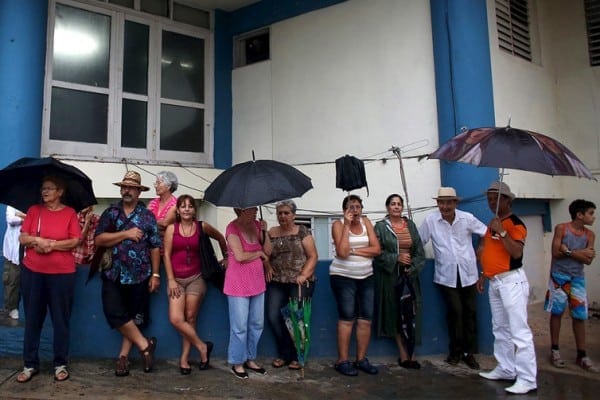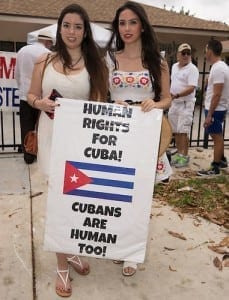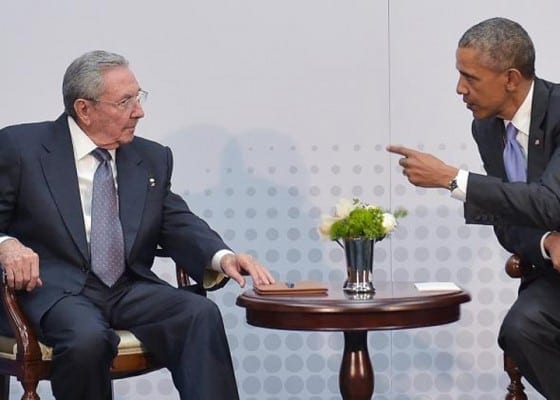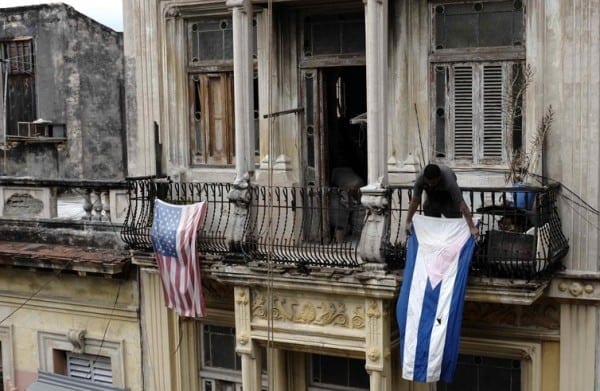Ever since the Cuban Revolution of 1959, led by Fidel Castro, swept the US puppet dictatorship of Fulgencio Batista from power, the island has stood as a beacon of dignity and independence to its many supporters across the world. However its struggle to remain so in the face of a decades-long US embargo has only allowed its socialist system to redistribute poverty rather than wealth. Despite this no one can deny Cuba’s outstanding achievements in the realms of healthcare and education, both provided as a right to its citizens regardless of income unlike the United States where both are a privilege of income. It is also an incontrovertible fact that compared to countries such as Jamaica, the Dominican Republic, and Haiti, each of which has been captive to free market nostrums in the decades in which Cuba has resisted them, the Cuban Revolution has been more than validated as an alternative developmental model for peoples of the Global South.
Moreover, Cuba’s famed medical missions overseas prove that the internationalism enshrined in its socialist constitution informs an engagement with the world that has been and is a testament to human solidarity. Washington’s engagement with the world, meanwhile, has been informed by endless military interventions, conflicts and wars, responsible for the mammoth destruction of human life.
This is why Obama’s intention to broach the issues of democracy and human rights during his three-day visit reveals astounding impertinence, not to mention arrogance. President of a country that continues to occupy Cuban territory, in the shape of the despised US Guantanamo, and which imprisons a full quarter of the entire world’s prison population, disproportionately comprising blacks and other minorities, is in no position to lecture anyone.

Average Cubans have been kept from the full promise of the revolution by Washington’s constant attacks and intrigues.
This being said, most Cubans will welcome the ending of hostile relations with the US, especially those born after the revolution with no experience or memory of life before it. The country’s antiquated and crumbling infrastructure is a symptom of the economic stagnation and lack of investment that its government no doubt hopes will be reversed now it has normalized relations with Washington. The worry in doing so is the extent to which the opening up and liberalization of Cuba’s economy may damage the bonds of solidarity that have allowed its people to survive everything from the collapse of the Soviet Union to the numerous hurricanes that have battered its coastline over the years. This is the challenge facing its government and institutions, maintaining a precarious balance between embracing the economic benefits promised by re-engagement with the US, while remaining vigilant when it comes to the danger it poses to social cohesion as the inequality that had already begun to appear in response to the country’s growing tourist trade inevitably deepens.

Diplomacy aside, what does Fidel really think of this “rapprochement” between idealistic Cuba and the fount of major contemporary evil?
Speaking of the island’s tourist trade, reports indicate that it is already struggling to cope with the huge influx of Americans taking advantage of the détente between both countries, producing a spike in the price of accommodation, food, taxi rides, and souvenirs. In story carried by Reuters in January it was revealed that in 2015 Cuba received a record number of visitors, 3.52 million, which was up 17.4 percent from 2014. The number of American tourists among that number, discounting hundreds of thousands of Cuban-Americans, was 161,000, amounting to an increase of 77 percent compared to 2014. The number of Americans descending on the island will only grow, which many fear will have a damaging effect when it comes to preserving the colonial-era architecture and other landmarks that make the Caribbean island so distinctive.

The imperialist brainwash dies hard.
On another level, the thought of thousands of cigar chomping, Bermuda shorts wearing, and hamburger eating Americans landing in Cuba and barking orders at waiters, taxi drivers, and hotel workers sends a chill sliding down the spine, especially when your average American is a cultural philistine whose idea of culture does not extend far beyond the kind found in frozen yogurt. In what may well turn out to be a sad irony, this army of tourists could achieve what decades of botched invasions, sabotage, assassination attempts, and covert plots to topple the country’s government over the years failed to in producing its political transformation. As the economy grows so will the demand for political reform, thus exerting more and more pressure on the status quo.
Still, it would be a mistake to view Obama’s visit as a one-way street. The US embargo of the island was a factor in the loss of prestige it has suffered in recent years across Latin America. In a part of the world where US leadership reigned unchallenged, Washington’s influence has never been weaker than in recent years. Until his death in 2013 Venezuelan president Hugo Chavez had replaced Fidel Castro as the personification of defiance when it came to Washington. But with Chavez gone, and with the Venezuelan economy struggling as the opposition to the Maduro government grows in strength, bringing Cuba in from the cold is the smart move.
Prior to Obama’s historic visit, the last US president to visit Cuba was Calvin Coolidge 89 years ago. Coolidge arrived on a battleship and took three three days to get there from Washington. In contrast, Obama’s only took three hours to arrive on Air Force One.
Those three hours may well turn out to be the most important in the island’s history since the Cuban Revolution of 1959, ending the country’s isolation and allowing its people to hope that the economic privations of the past will not be part of their future. The survival of a revolution that has achieved so much in spite of those privations will depend on the worth the current generation of Cubans attaches to the bonds of human solidarity that previous generations have struggled to preserve.
Note to Commenters
Due to severe hacking attacks in the recent past that brought our site down for up to 11 days with considerable loss of circulation, we exercise extreme caution in the comments we publish, as the comment box has been one of the main arteries to inject malicious code. Because of that comments may not appear immediately, but rest assured that if you are a legitimate commenter your opinion will be published within 24 hours. If your comment fails to appear, and you wish to reach us directly, send us a mail at: editor@greanvillepost.com
We apologize for this inconvenience.
=SUBSCRIBE TODAY! NOTHING TO LOSE, EVERYTHING TO GAIN.=
free • safe • invaluable
Nauseated by the
vile corporate media?
Had enough of their lies, escapism,
omissions and relentless manipulation?
Send a donation to
The Greanville Post–or
But be sure to support YOUR media.
If you don’t, who will?







